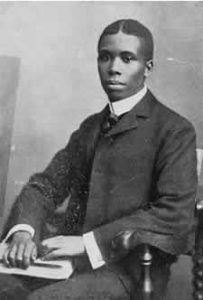
Paul Laurence Dunbar was born on June 27, 1872 to Joshua and Matilda Murphy Dunbar, who were former slaves at the time. Though his parents separated shortly after his birth, Dunbar would draw on stories from their days as slaves throughout his writing career. When he was only 4 years old, his mother began teaching him to read, which allowed him a head start on his education beyond conditions of other students.
In 1886, Dunbar attended Central High School in Dayton, Ohio, an all Caucasian school. Though he faced being the only African American in his class, he excelled as a student and became the editor of his school newspaper. After being successful in high school and graduating, he wished to attend a college, however, he was unable to because of lasting effects of racial discrimination. Therefore, he instead started looking for a job in a law office, but eventually settled for a job as an elevator operator.
Though being discriminated against and prevented from being able to attend further education, Dunbar never gave up on his dream of becoming a writer. In 1893, when he was still working as a elevator operator, he self-published his collection titled Oak and Ivy. To help pay for the costs, he would sell copies to riders in his elevator for a single dollar.
In 1895, his pieces were being published in national magazines and newspapers, such as The New York Times. This eventually led to him being recognized internationally, which then allowed him to travel over seas to present his works. Upon returning to the states, he befriended Frederick Douglass, who helped him find a job as a clerk at the Library of Congress in Washington, D.C., and at the same time continued to work oh his individual poetry. Soon after, he would meet and marry his wife, Alice Ruth Moore.
In 1898, Dunbar’s health began to deteriorate, gaining tuberculosis, suspected to be from the dust in the library where he worked. Because of this, he would soon leave his job and dedicate himself full-time to writing and reading his poetry. Later in 1902, he would divorce his wife, and shortly after, he suffered a nervous breakdown and developed pneumonia, which would force him to move back in with his mother in his home town of Dayton, Ohio. Four years later, he then died on February 9, 1906 at the age of 33.
Bibliography
https://www.poets.org/poetsorg/poet/paul-laurence-dunbar?gclid=Cj0KCQjwp_DPBRCZARIsAGOZYBSV3rhubMaPl_giSat7gOXHVkL0prDeQSlGoX3BDBaWTIn77n_ir9caAk4hEALw_wcB
http://www.notablebiographies.com/De-Du/Dunbar-Paul-Laurence.html
https://www.poetryfoundation.org/poems/44203/we-wear-the-mask
https://www.poetryfoundation.org/poems/46459/sympathy-56d22658afbc0
